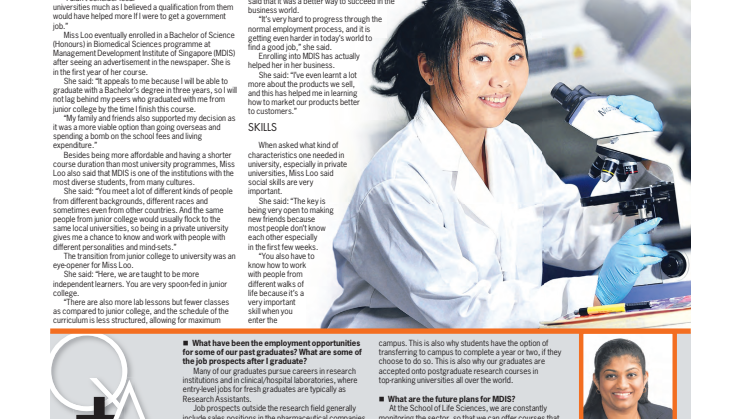News -
Student diversity helps Felicia Loo build business, people skills
AFTER her A-level results last year, Miss Felicia Loo, 20, was unsure of her future study plans. She said: “I was looking for overseas options initially, but eventually considered some of the private universities. I wanted a recognised course that wouldn’t cost too much, with a good course duration. “I didn’t consider local universities much as I believed a qualification from them would have helped more If I were to get a government job.”
Miss Loo eventually enrolled in a Bachelor of Science (Honours) in Biomedical Sciences programme at Management Development Institute of Singapore (MDIS) after seeing an advertisement in the newspaper. She is in the first year of her course.
She said: “It appeals to me because I will be able to graduate with a Bachelor’s degree in three years, so I will not lag behind my peers who graduated with me from junior college by the time I finish this course. “My family and friends also supported my decision as it was a more viable option than going overseas and spending a bomb on the school fees and living expenditure.”
Besides being more affordable and having a shorter course duration than most university programmes, Miss Loo also said that MDIS is one of the institutions with the most diverse students, from many cultures. She said: “You meet a lot of different kinds of people from different backgrounds, different races and sometimes even from other countries. And the same people from junior college would usually flock to the same local universities, so being in a private university gives me a chance to know and work with people with different personalities and mind-sets.”
The transition from junior college to university was an eye-opener for Miss Loo. She said: “Here, we are taught to be more independent learners. You are very spoon-fed in junior college. “There are also more lab lessons but fewer classes as compared to junior college, and the schedule of the curriculum is less structured, allowing for maximum flexibility. “Some of my classmates even have the time to do part-time jobs where they can work in between classes, and yet remain focused in their studies.” Miss Loo herself helps run a friend’s private business.
She said: “I started helping in my friend’s anti-aging business after my A-level examinations. I help do everything from finding distributors to marketing the products.” When asked why she decided to help manage a business instead of finding a normal job, Miss Loo said that it was a better way to succeed in the business world. “It’s very hard to progress through the normal employment process, and it is getting even harder in today’s world to find a good job,” she said.
Enrolling into MDIS has actually helped her in her business. She said: “I’ve even learnt a lot more about the products we sell, and this has helped me in learning how to market our products better to customers.” SKILLS When asked what kind of characteristics one needed in university, especially in private universities, Miss Loo said social skills are very important.
She said: “The key is being very open to making new friends because most people don’t know each other especially in the first few weeks. “You also have to know how to work with people from different walks of life because it’s a very important skill when you enter the workforce. Meeting all kinds of people will give us a chance to break down some of our stereotypes. “This will help us to be flexible in solving problems when working as part of a team.” Registration for the Bachelor of Science (Honours) in Biomedical Sciences programme is already open and applications will close at the end of this month.
Questions answered by Dr Lissy Vadakel, Director of the School of Life Sciences at Management Development Institute of Singapore (MDIS)
Q&A:
What have been the employment opportunities for some of our past graduates?
What are some of the job prospects after I graduate?
Many of our graduates pursue careers in research institutions and in clinical/hospital laboratories, where entry-level jobs for fresh graduates are typically as Research Assistants. Job prospects outside the research field generally include sales positions in the pharmaceutical companies. Marketing positions open up to graduates after a few years of sales experience. Some graduates opt to pursue further studies, venturing into postgraduate courses in UK, US, Australia, New Zealand and Singapore. Many of our graduates have been accepted to Master’s and/or PhD courses at top universities.
Are the degrees awarded in Singapore the same as those awarded by the parent university? The degrees are awarded by the universities with whom we partner, and are exactly the same as on campus. This is also why students have the option of transferring to campus to complete a year or two, if they choose to do so. This is also why our graduates are accepted onto postgraduate research courses in top-ranking universities all over the world.
What are the future plans for MDIS?
At the School of Life Sciences, we are constantly monitoring the sector, so that we can offer courses that are relevant to our students and prepare them for careers in this exciting field. With Singapore’s focus on healthcare and the global challenges of increasingly aging populations, we offer a postgraduate course in healthcare management to prepare graduates for administrative and planning/decision-making roles in this sector. Biotechnology is another sub-sector which promises to open up job opportunities for Life Sciences graduates. MDIS currently offers a degree course in Biotechnology and we have plans to expand the range of courses we offer.
Source:[The New Paper Go Guide 01032013] © Singapore Press Holdings Limited.
Reproduced with permission".
Related links
Topics
- Adult education
Categories
- school of health and life sciences
- bachelor of science
- biomedical sciences


